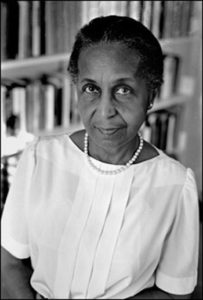
Eileen J. Southern
This date celebrates the birth of Eileen Jackson Southern, a Black musicologist born in 1920.
Eileen Jackson was born in Minneapolis and attended public schools in Sioux Falls and Chicago. She graduated from Lindblom High School in Chicago and studied piano at Chicago Musical College, giving her first recital at 12 and making a debut in Chicago’s Orchestra Hall at 18. She won piano performances and essay competitions, taught piano lessons, and directed musical activities at the Lincoln Community Center--all activities that contributed to her musical and intellectual growth.
As she developed as a pianist, Eileen was introduced to and became partial to the music of those she calls the "piano composers," including Bach, Beethoven, and Debussy. In addition, her piano teachers, mostly white, were concerned that she also knew the music by Black composers and introduced her to R. Nathaniel Dett's "In the Bottoms," among other such compositions. She earned bachelor’s and master’s degrees at the University of Chicago (1940 and 1941). Her relationship with Cecil Smith encouraged her to further develop her interest in Negro folk music. He advised her master's thesis on “The Use of Negro Folksong in Symphonic Form.”
Restricted by the limitations of segregation, she began her teaching career at Historically Black Colleges, including Prairie View A&M in Texas, Southern University in Louisiana, and Claflin College in South Carolina. During the 1940s, she toured the country as a concert pianist, performing in 1948 at Carnegie Hall after winning a national competition. She received another degree from New York University (Ph.D., 1961).
Southern also studied piano privately at Chicago Musical College, the Juilliard School of Music, and Boston University. Perhaps Southern’s most significant contribution to American musical history was her book The Music of Black Americans, published in 1971. Her book reached the height of the controversy over black studies and made a strong case for what the discipline could produce.
Southern went to Harvard as a lecturer in 1974, becoming the first black woman appointed full professor with tenure in 1975. She chaired the Department of Afro-American Studies from 1976 to 1980 and retired in 1987 as professor emeritus. At the core of Southern’s scholarly contribution was "The Music of Black Americans: A History," first published in 1971 and now in its third edition (Norton, 1997). Although previous authors had interpreted individual aspects of African American music, this was the first thoroughgoing scholarly treatment of the subject. She published a string of subsequent books on related topics,
In an era when white-European “canons” ruled the academic study of music, Southern countered with a list of “five milestones in the history of African American composition,” including major works by Frank Johnson, Bert Williams, George Walker, William Marion Cook, Scott Joplin, William Grant Still, and Duke Ellington. This was a bold, genre-defying list, putting jazz and music for the theater alongside the concert tradition.
Southern was widely recognized during her lifetime. In 2001, she received a National Humanities Medal as a musicologist who “helped transform the study and understanding of American music.” She also received the Lifetime Achievement Award 2000 from the Society for American Music.
She retired to live in St. Albans, New York, but died at 82 at her home in Port Charlotte, FL., survived by her husband of 60 years, Joseph Southern.
Black Women in America: An Historical Encyclopedia
Volumes 1 and 2, edited by Darlene Clark Hine
Copyright 1993, Carlson Publishing Inc., Brooklyn, New York
ISBN 0-926019-61-9
Harvard University Gazette Online, June 14, 2007